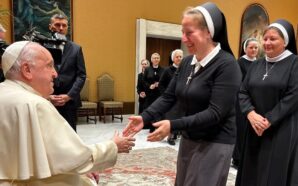The first of four reports from the Vatican by Brother Mark O’Connor FMS, Vicar for Communications, Diocese of Parramatta and Pope Francis Fellow, Newman College, University of Melbourne.
A NEW CONSISTORY FOR A GLOBAL CHURCH
Rome in August is notoriously hot and humid. Most locals flee the eternal city and there is little escape from the intense heat. There was certainly no breeze to cool things down yesterday afternoon!
Yet, it was a wonderful refreshing day of another sort for the Universal church, where the Spirit was clearly moving. Another different type of gentle ‘breeze’ was blowing within the confines of St Peter’s Basilica, as 20 new cardinals were created by Pope Francis.
It was an afternoon where one saw how ‘spot on’ was the great Jesuit theologian Karl Rahner SJ. Decades ago, Rahner prophesised that Vatican II would be eventually seen as the beginning of the Roman Catholic Church’s future as a truly “world church.”
And here, in front of our very eyes, was the sight of a Pope duly elected as bishop of Rome, more than half a century after Vatican II, who is not from the Euro-Mediterranean area, and who can therefore be understood as the first pope of Rahner’s “world church”: a truly global, non-Eurocentric church. Here indeed was Vatican II’s vision fully alive and well!
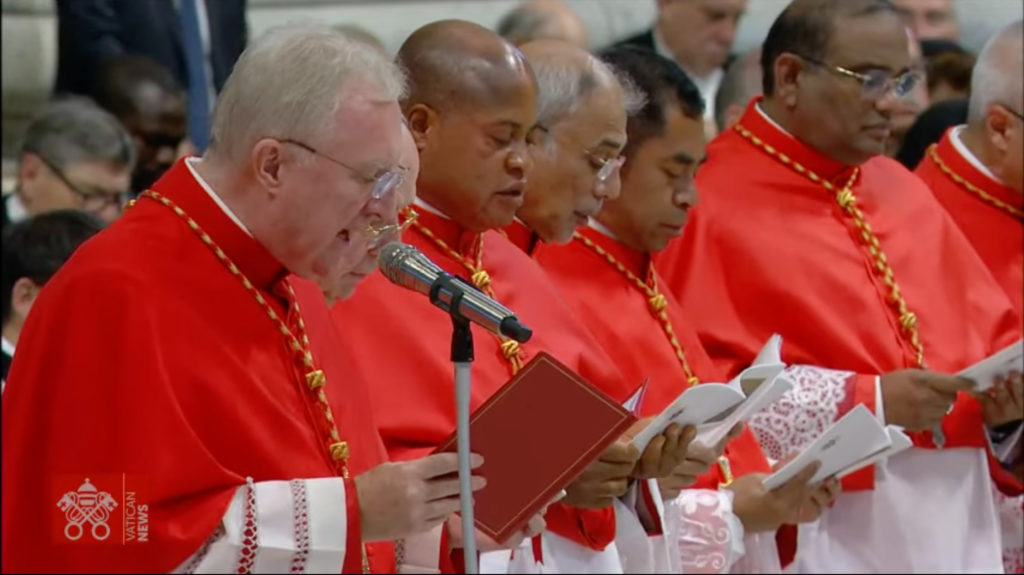
A screenshot of some of the new Cardinals are seen during the Ordinary Public Consistory for the creation of new Cardinals and for the vote on some Causes of Canonization in St. Peter’s Basilica. Image: Vatican News/YouTube
For in Pope Francis, presiding over the local churches as Peter, we have a Pope who brings, in his own person, the Global South to the heart of Rome. Rahner saw the emergence of this world Church, as marking the end of the period when Catholicism could be equated with its expression in the forms of Graeco-Roman, Mediterranean, or European culture.
And today in Rome we were truly witnessing the ongoing emergence of a new multicultural Catholicism, in which all the regional churches may be expected to interact, mutually criticising and enriching one another, united by Peter.
These churches and their leaders from the various continents have visibly acquired a new sense of their own distinctive identity. They do not simply learn from Europe. They now feel a responsibility to shape the future of the Church in their own parts of the world and to contribute insights based on their own experience. As St John Paul II once put it: A faith that does not become culture is a faith not fully received, not entirely pondered, not faithfully lived.
St John Paul II’s prophetic vision has now been fulfilled and made flesh in Francis’s ongoing spirit-led choice of Cardinals from the ‘peripheries’. Here we have leaders who show us precisely how ‘faith and culture’ can be integrated and lived as the pilgrim people of God.
A fine analysis of all these leaders can be found at: https://www.americamagazine.org/faith/2022/08/26/pope-cardinal-electors-2022-243634 and https://wherepeteris.com/new-cardinals-round-up/
But let me just highlight just a few of the new Cardinals and their significance for the future of our global church.
It is striking that Pope Francis has appointed six new Cardinals from Asia (see the analysis at https://www.asianews.it/news-en/Pope-chooses-21-new-cardinals,-6-from-Asia-55913.html)
Close to the heart of many Australians who have stood in solidarity with the long-suffering people of Timor-Leste is the appointment of 54-year-old Archbishop Dom Virgilio do Carmo da Silva of Dili as the Catholic-majority country’s first-ever cardinal… Dom Virgílio do Carmo da Silva stands out for his humility, knowledge and peaceful spirit.
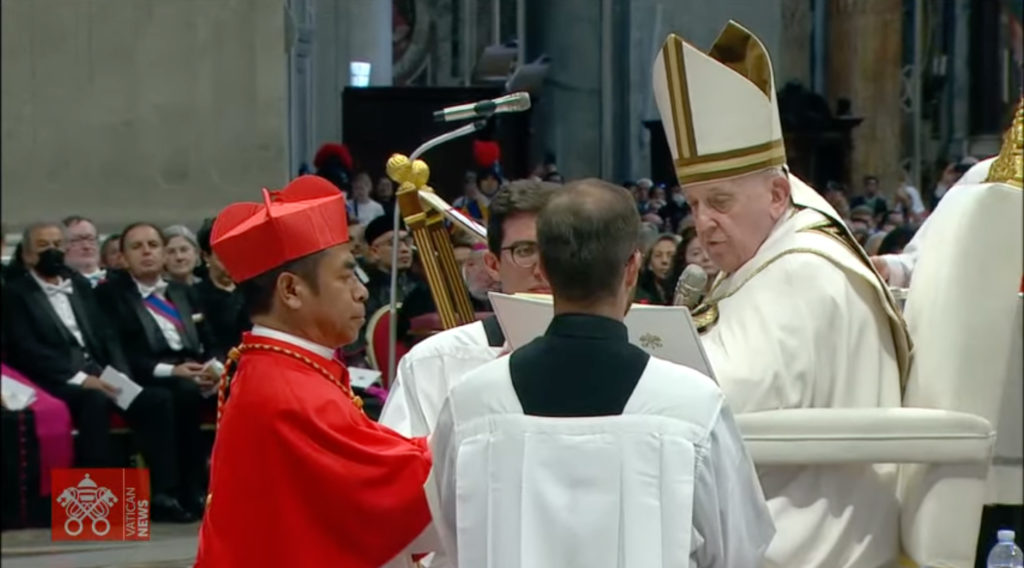
Archbishop Dom Virgilio do Carmo da Silva of Dili, Timor-Leste is presented with his biretta, cardinalatial ring and assignation of the title or deaconry by Pope Francis during the Ordinary Public Consistory for the creation of new Cardinals and for the vote on some Causes of Canonization in St. Peter’s Basilica. Image: Vatican News/YouTube
Another deeply symbolic appointment by Pope Francis was of Archbishop Anthony Poola of Hyderabad, India. He is the first Dalit (the so-called “untouchable” caste) to be made a cardinal in the church’s history. In a world where indigenous peoples have been treated so appallingly, Francis is reaching out in solidarity with all minority groups.
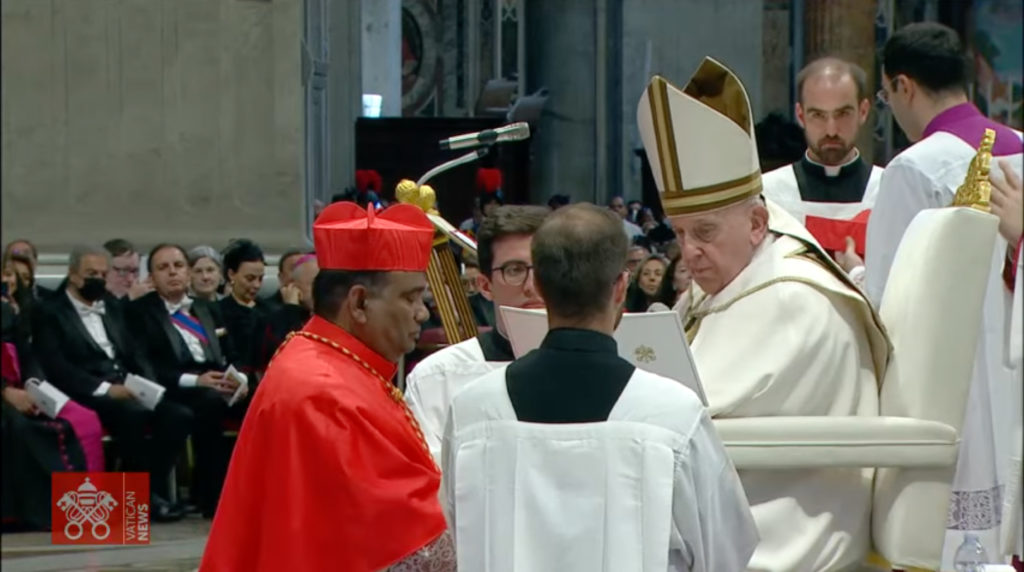
Archbishop Anthony Poola of Hyderabad, India, is presented with his biretta, cardinalatial ring and assignation of the title or deaconry by Pope Francis during the Ordinary Public Consistory for the creation of new Cardinals and for the vote on some Causes of Canonization in St. Peter’s Basilica. Image: Vatican News/YouTube
Yet another notable new Cardinal is the Italian Consolata Father Giorgio Marengo, 48, apostolic prefect of Ulan Bator (Mongolia): whose ministry in a largely Buddhist country says so much about Pope Francis’s missionary impetus and his outreach to peoples of other faiths.
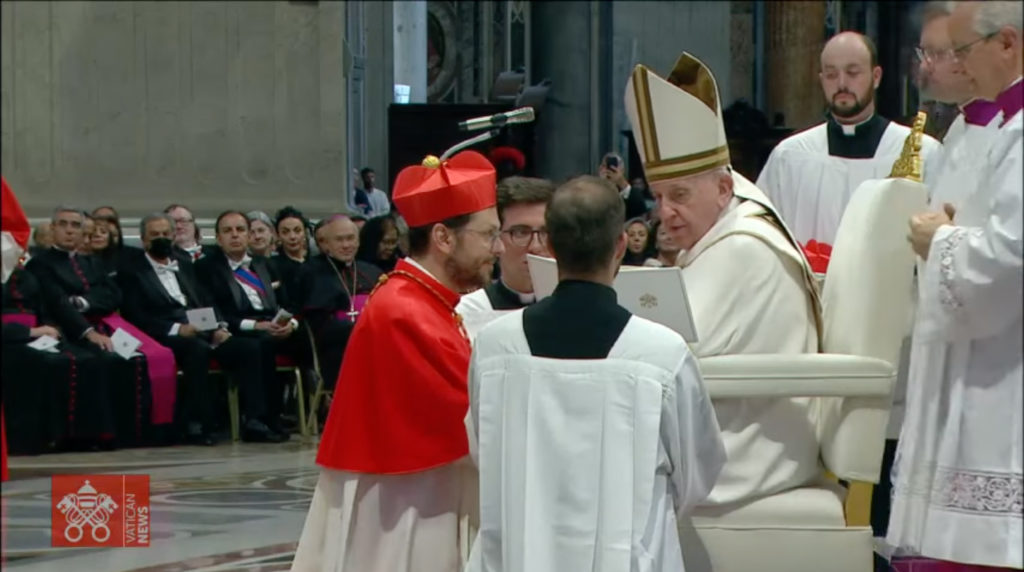
Consolata Father Giorgio Marengo, 48, apostolic prefect of Ulan Bator (Mongolia) is presented with his biretta, cardinalatial ring and assignation of the title or deaconry by Pope Francis during the Ordinary Public Consistory for the creation of new Cardinals and for the vote on some Causes of Canonization in St. Peter’s Basilica. Image: Vatican News/YouTube
From the English-speaking world, the naming of Bishop Bob McElroy of San Diego as a Cardinal indicates where Pope Francis sees the future priorities of a polarised Church in the USA. McElroy is highly intelligent, articulate, pastoral and understands the ‘culture wars’ strategy of many U.S.A bishops (and a few Australian ones) are a dead-end street for the church. See: https://www.vaticannews.va/en/pope/news/2022-08/meet-the-newest-cardinal-from-the-united-states.html
Cardinal McElroy is certainly not afraid to speak truth to power. A few years ago, he gave a powerful speech translating Pope Francis’s vision as it applied to the current polarised, conflict-driven mess of USA society and church. It still remains very relevant. See: https://www.commonwealmagazine.org/disrupting-donald
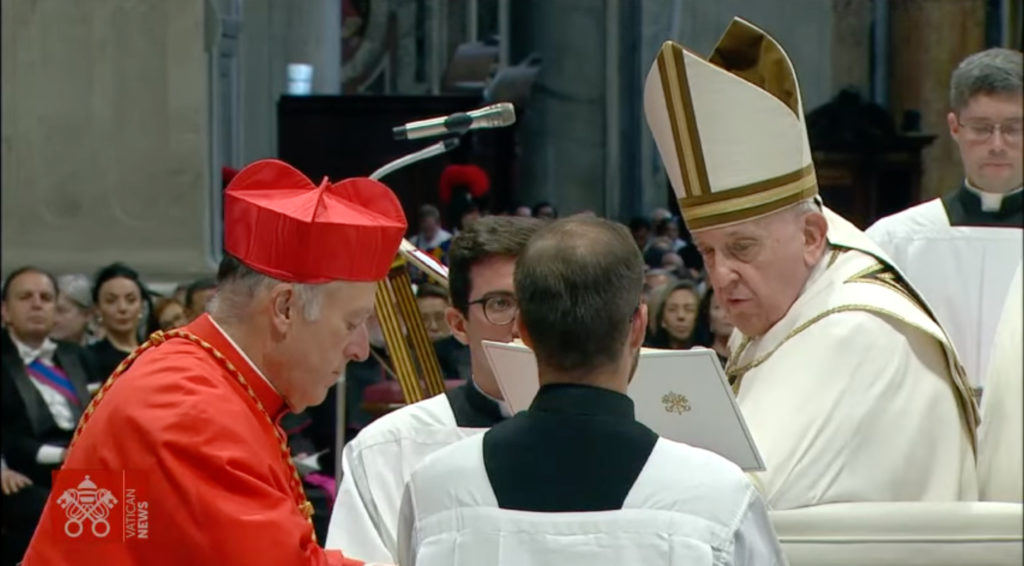
Bishop Robert McElroy of San Diego, California, United States, is presented with his biretta, cardinalatial ring and assignation of the title or deaconry by Pope Francis during the Ordinary Public Consistory for the creation of new Cardinals and for the vote on some Causes of Canonization in St. Peter’s Basilica. Image: Vatican News/YouTube
And so, to Pope Francis’s powerful homily on Saturday, where he was his usual magnificent, poetic and pastoral self! (https://www.vatican.va/content/francesco/en/homilies/2022/documents/20220827-omelia-concistoro.html)
In Francis, we are so blessed with a mystic pope, touched by God’s love. He told the new Cardinals that “the Lord wants to bestow on us his own apostolic courage, his zeal for the salvation of every human being, without exception. He wants to share with us his magnanimity, his boundless and unconditional love.”
And Francis called each of them to become “a man of apostolic zeal impelled by the fire of the Spirit to be concerned, courageously, with things great and small, ‘to suffer no restriction from anything however great, and yet to be contained in the tiniest of things, that is divine’.”
For a comprehensive analysis of the Consistory ceremony, see: https://www.americamagazine.org/faith/2022/08/27/pope-francis-consistory-cardinals-mcelroy-243621
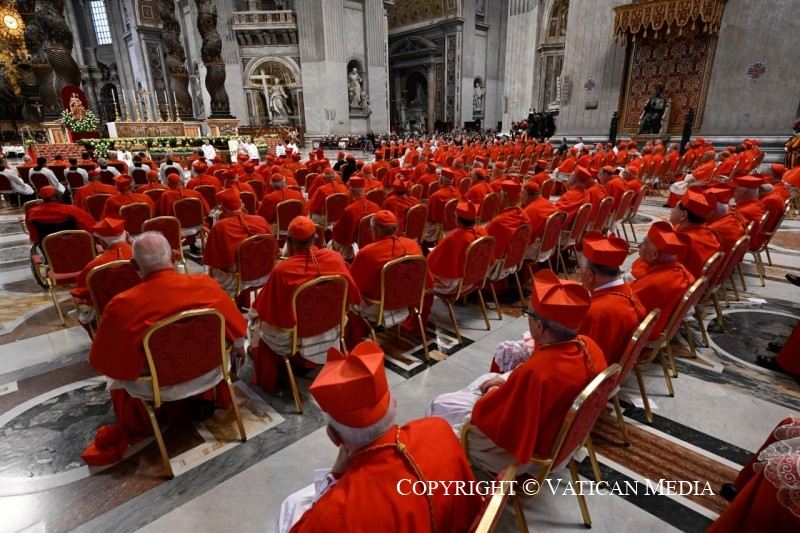
A view of the cardinals during the Ordinary Public Consistory for the creation of new Cardinals and for the vote on some Causes of Canonization in St. Peter’s Basilica. Image: Vatican Media
Conclusion:
This remarkable Consistory clearly demonstrates that the emergence of the world Church, as depicted by Karl Rahner years ago, is both a reality and great a blessing for our Church.
Pope Francis is magnificently implementing the full vision of Vatican II for our troubled times. His emphasis on diversity, especially in the College of Cardinals, is surely needed for Catholicism to continue to become vitally implanted in the six continents and especially in Asia, Africa, and Latin America, where the future of the Church is largely to be found.
Stay tuned. Next – on Monday 29 August and Tuesday 30 August, we will see the whole College of Cardinals – including voting and non-voting cardinals, eastern Patriarchs and superiors of the Holy See’s Secretariat of State – meet to discuss Pope Francis’ new constitution for the Church’s central government (the Roman Curia). See: https://www.vatican.va/content/francesco/en/apost_constitutions/documents/20220319-costituzione-ap-praedicate-evangelium.html
One of the central reasons Francis was elected was to reform a Roman Curia widely held to be seriously dysfunctional. It has taken Francis 10 years to bring this reform to fruition. And he still faces considerable opposition. https://wherepeteris.com/franciss-curia-reforms-recommended-reading/

Pope Francis speaks during the Ordinary Public Consistory for the creation of new Cardinals and for the vote on some Causes of Canonization in St. Peter’s Basilica. Image: Vatican Media
How will it go? Will the ‘old guard’ still attempt to block Pope Francis yet again? Some are saying the meeting will be stormy! One hears that not a few Cardinals are alarmed about the decision of Francis to allow lay people to exercise governance at all levels of the Roman Curia including the dicasteries of the Doctrine of Faith and that of Bishops!
But no matter – whatever the ups and downs – Pope Francis is resolute in his determination to lead the People of God to a deeper implementation of Vatican II. Pope Francis is a gentle pastoral leader but also a man of steely determination…
If, as Massimo Faggioli shrewdly points out, Paul VI was elected in 1963 to start the implementation of Vatican II, then perhaps the next conclave will search for a new Pope who can strengthen and deepen the church’s recovery of Synodality as central to its mission?
The eminent Australian theologian Ormond Rush maintains: Synodality is Vatican II in a nutshell. How the ongoing practice of Synodality plays out in the coming days at the Cardinal’s meeting and at the Synod on Synodality in October 2023, could be quite momentous.
But more of that in the next few ‘soundings’.
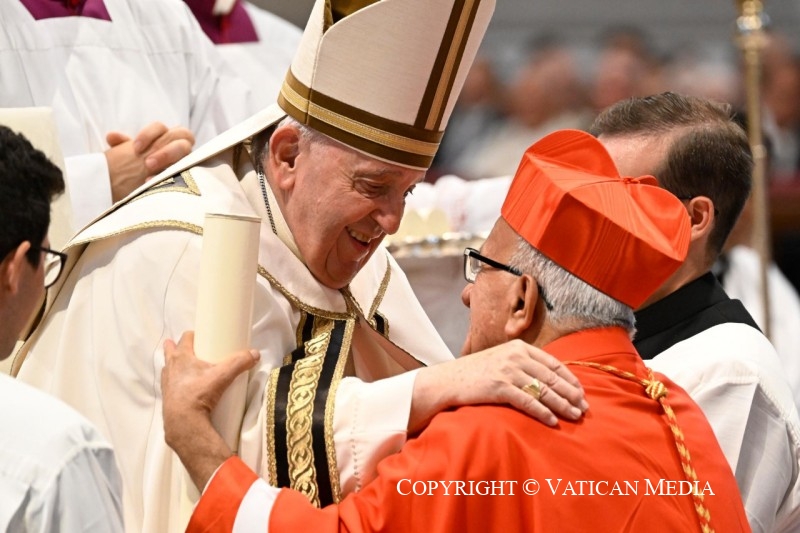
Pope Francis embraces one of the new cardinals during the Ordinary Public Consistory for the creation of new Cardinals and for the vote on some Causes of Canonization in St. Peter’s Basilica. Image: Vatican Media
Br Mark O’Connor FMS is the Vicar for Communications, Diocese of Parramatta and Pope Francis Fellow, Newman College, University of Melbourne.
With special thanks to the PAYCE Foundation for their sponsorship of the Pope Francis Fellowship at Newman College and these ‘Soundings’ from Rome.






